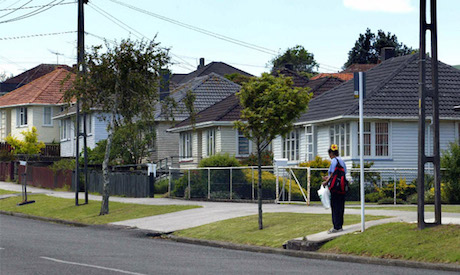“We are concerned that selling 20 per cent of state housing and possibly investing this capital away from social housing will reduce housing availability,” says Caritas Aotearoa New Zealand Director Julianne Hickey.
“This could further divide communities and reduce the security of low-income tenants, as we have already seen in communities like Pomare in Lower Hutt and Glen Innes in Auckland.”
“Shelter is one of our most fundamental needs, as people need to live in an environment which provides stability and a sense of belonging” she said.
“And as an essential collective good, state housing exists to meet the needs of the most vulnerable for affordable and secure homes.”
“Caritas welcomes the expansion of social housing options in the community and private sector, as long as this complements state housing provision rather than becoming a substitute for it.”
Hickey says Housing New Zealand has not been transparent about the possible criteria and conditions for the sales of state houses, and Caritas strongly believes that affected communities and social housing providers need the opportunity to have input in this process.
Both Bill English and Paula Bennett have raised the prospect that up to a third of state houses could be sold.
That would be more than 22,000 homes valued at over $5 billion.
They are said to be in the wrong place, or to be otherwise unsuitable.
But John Key said no decision has been made on how many houses will go.
He said the sale would not amount to asset sales.
“If at the end of the day, Housing NZ sells a few state houses, well, actually, that’s happened for a long period of time. We often trade our stock.
“So if we sell some individual state houses, it’s not an asset sale. If we sold Housing New Zealand or part of it, it would be, and we have absolutely no plans to sell,” he said.
Key says that groups such as the Salvation Army would be offered the houses at a discounted rate.
“The question isn’t about reducing the amount of housing, the question is about how do we more rapidly provide more housing,” he said.
Key also said the number of state houses sold over the next three years would be “less than the numbers being banded around.”
Building 1000 state houses would cost an estimated $500 million, while providing income-related rent subsidies to community groups would cost an estimated $12m a year.
Key said there was a legitimate question to ask about what happened to money from Housing NZ’s balance sheet, from the sale of state houses, and if that would be reinvested in other housing initiatives.
“The answer is, we’ll give you that answer very soon,” he said.
Source
- Supplied:
- Radio New Zealand
- Radio New Zealand
- Stuff.co.nz
- Image: Stuff.co.nz
News category: New Zealand.




